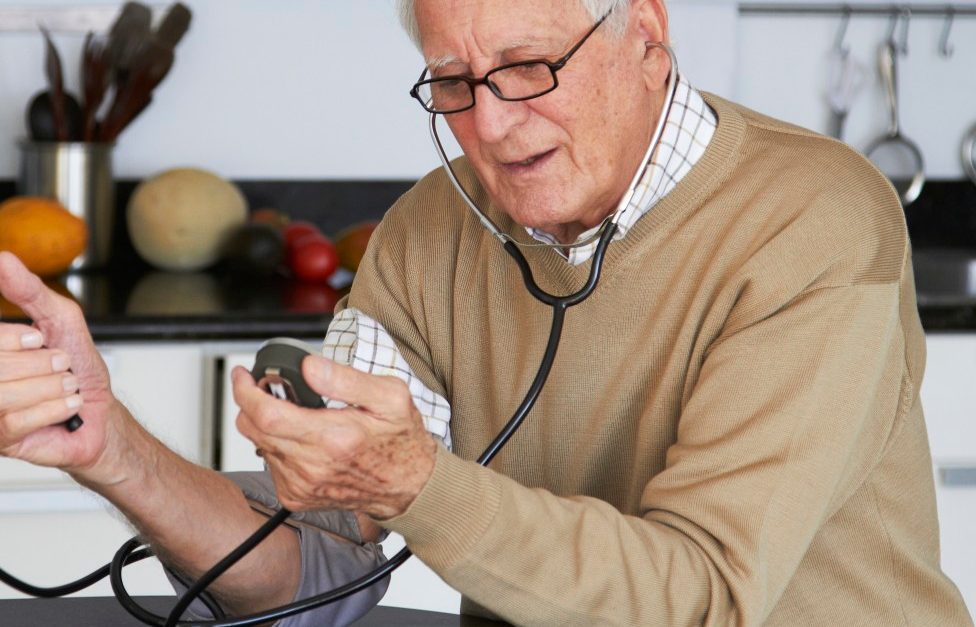High Blood Pressure Treatment

High blood pressure treatment with lifestyle changes plus medication, if needed, can lower your risk for strokes, heart attacks, and kidney disease.
High blood pressure, often called hypertension, is a common and potentially serious condition. It occurs when blood flows through your arteries at a higher-than-normal pressure. Over time, this elevated force of blood pushing against arteries can cause vascular damage, raising your risk for heart attacks, strokes, chronic kidney disease, eye damage, and vascular dementia, the National Heart, Blood and Lung Institute (NHBLI) points out.
Hypertension is a common condition in the U.S. About nearly 120 million adults have it, according to the Centers for Disease Control and Prevention. Often known as “the silent killer,” high blood pressure usually has no obvious symptoms, and many people are unaware they have the condition.
YOU MIGHT ALSO LIKE: What Causes High Blood Pressure?
That’s why it’s important to know your blood pressure numbers and, if they are elevated, work with your doctor on a high blood pressure treatment plan to get your numbers down, to avoid serious health complications.
Who needs high blood pressure treatment?
Everyone from age three years old throughout life should have their blood pressure checked at least once a year, the NHLBI advises. To find out whether your blood pressure is in the normal range, your doctor will take two or more readings, usually at separate medical appointments, using a device called a sphygmomanometer that works with an inflatable cuff.
The resulting measurements show a top number, the systolic blood pressure, which reveals the pressure in your blood vessels when your heart beats. The second number is the diastolic blood pressure, the pressure inside blood vessels when your heart is resting between beats.
If your blood pressure readings are elevated, your doctor will likely diagnose you with either primary or secondary high blood pressure. Primary (also called essential) high blood pressure is the most common type; it tends to develop over the years as you age. Secondary high blood pressure is caused by another medical condition (which may need treatment to lower your blood pressure), or it may be a side effect of a medication your doctor can adjust or discontinue.
Updated guidelines from the American College of Cardiology and the American Heart Association help doctors and patients know when blood pressure is normal or needs high blood pressure treatment:
- Normal blood pressure: Less than 120/80.
- Elevated blood pressure: Systolic pressure between 120 and 129 and diastolic pressure less than 80.
- Stage 1 hypertension: Systolic pressure between 130 and 139 or diastolic pressure between 80 and 89.
- Stage 2 hypertension: Systolic pressure at least 140 or diastolic pressure at least 90.
- Hypertensive crisis: Systolic pressure over 180 and/or diastolic pressure over 120. If there are no other signs of immediate health problems, you need changes in your medication ASAP. Urgent hospitalization is recommended if there are signs and symptoms of organ damage along with your high blood pressure.
Lifestyle changes as high blood pressure treatment
The blood pressure level that indicates you need treatment is now lower than it was several years ago, based on research showing increased health risks over time from even slightly elevated blood pressure.
"It doesn't mean you need medication, but it's a yellow light that you need to be lowering your blood pressure, mainly with non-drug approaches,” explained Tulane University epidemiologist Paul K. Whelton, MD, lead author of the updated guidelines.
These heart healthy lifestyle changes can be a highly effective high blood pressure treatment, according to the NHBLI:
- Heart healthy eating. NHLBI-funded research found the DASH diet, which emphasizes low-salt meals rich in vegetables, fruits, low-fat protein, and whole grains can be as effective as medicines in lowering high blood pressure for many people.
- Lose excess pounds. Adults who are overweight or obese and lose five to 10 percent of weight over about six months can improve overall health. Losing just 3 to 5 percent of weight can lower blood pressure.
- Regular exercise. Studies show regular physical activity can lower and control high blood pressure levels. Before starting any exercise program, talk to your doctor about what’s right for you.
- Manage stress. Try yoga, relaxation techniques, and therapy, if needed, to lower stress levels and possibly your blood pressure.
- Quit smoking. Smoking not only raises blood pressure but also increases your risk for many health problems. For free support, call the National Cancer Institute’s Smoking Quitline at 1-877-44U-QUIT (1-877-448-7848).
Don’t skip prescribed blood pressure medications
If exercise, a low-salt diet, and other changes don’t control or lower your blood pressure adequately, your doctor will likely add prescription medications to your high blood pressure treatment plan, the NHBLI notes. The specific drugs will depend on any other conditions you may have, such as heart disease or kidney disease, and should be taken regularly.
Frequently prescribed, effective high blood pressure medicines include:
- Angiotensin-converting enzyme (ACE) inhibitors and angiotensin II receptor blockers (ARBs), two classes of medication that keep blood vessels from narrowing.
- Calcium channel blockers, which keep calcium from entering the muscle cells of your heart and blood vessels, allowing blood vessels to relax and blood pressure to decrease.
- Diuretics (water or fluid pills) to flush excess sodium from your body, reducing the amount of fluid in your blood and lowering blood pressure. Diuretics are often used in combination with other high blood pressure medicines, sometimes in one combined pill.
If you have side effects from any medication, contact your doctor or pharmacist to discuss changing the dosage or trying a different drug therapy — but never stop taking blood pressure medicines abruptly.
Updated:
March 08, 2023
Reviewed By:
Janet O’Dell, RN